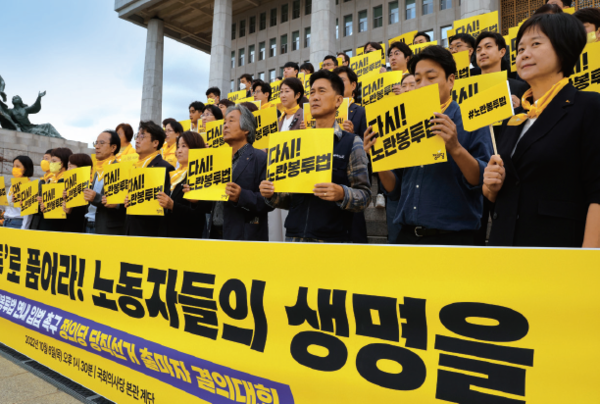Seoul: Lee restarts with the law on the right to strike
On August 4, parliament will vote on the Yellow Envelope Law, a measure that blocks companies from seeking compensation from workers for “illegitimate” protests and extends liability to subcontractors. Already approved last year, the bill was blocked by a veto from then-conservative President Yoon. The chaebol, Korea's large industrial conglomerates, are opposed to the bill, fearing they will lose further ground.
Milan (AsiaNews/Agencies) - South Korea's parliament is preparing to vote on an important - and controversial - law on workers' rights. On August 4, deputies from the Democratic Party of Korea, the party of President Lee Jae Myung, which has a majority in the legislature, are expected to give final approval to amendments to the Labor Union Act, known as the Yellow Envelope Law. If enacted, the reform would significantly strengthen workers' rights and the power of trade unions in a country characterized by stark social inequalities, fierce competition, and a system often riddled with corruption.
In Seoul, the chaebol (large industrial conglomerates) traditionally dominate the labor market and block attempts at reform, with allegations of exploitation by workers who have long been demanding greater protections. However, in the delicate balance between economic interests and rights, some in the country fear that such measures could slow down—or even paralyze—the economy, which is already struggling due to trade tensions with the US, only recently eased by a 15% tariff agreement. Lee seems determined to follow through on his election promise, unblocking a measure that his predecessor, conservative Yoon Suk-yeol, who was impeached after attempting to impose martial law, had blocked last year using his presidential veto.
The Yellow Envelope Law owes its name to a popular initiative in 2014, when citizens decided to collectively support workers laid off by SsangYong Motor by sending donations in yellow envelopes. The former employees of the company, in line with the legislation still in force, found themselves in serious difficulty: despite being out of work, they were burdened with the task of compensating their employer for all the financial losses caused by the strike. Since then, the yellow envelope has become a symbol of solidarity with the workers and, according to some, the name of the law is in itself overly political and misleading. The Yellow Envelope Law evokes a moment of strong national compassion, distracting attention from the actual content of the amendment.
In concrete terms, the proposed changes affect Articles 2 and 3 of the Trade Union and Labor Relations Adjustment Act, strengthening the right to strike and redefining the employer's responsibility, including in subcontracting relationships. The first key point of the reform aims to protect and expand the right to strike. In South Korea, the right to strike is formally guaranteed by law, but in practice it faces several obstacles. Companies can sue unions for substantial financial compensation for damages suffered during strikes (the popular protest that gave the law its name arose from a case of this kind). The problem stems from the fact that the cases in which the law allows protest through work stoppages are very limited, so most strikes are considered illegal. And if a strike is deemed illegal, the company can claim compensation that includes all losses in revenue caused by the work stoppage.
Given that these are often large industrial giants, the compensation demanded is often beyond the reach of workers. As a result, workers and union leaders are discouraged from organizing protests because of the economic risk they would face. Under the new law, however, workers could strike even on issues currently excluded from union negotiations: disciplinary measures, dismissals, and even investment decisions or corporate restructuring. On the one hand, therefore, it would be a way of rebalancing the power relationship between companies and workers by promoting participation. For critics, however, it would amount to forcing companies to obtain union approval before making important business decisions. It could also lead to continuous strikes, bringing industrial production to a standstill.
The other key issue in the reform is the broadening of the definition of ‘employer’. In concrete terms, this would mean that even employees hired by subcontractors could negotiate directly with large contracting companies. The aim is to make multinationals responsible for working conditions in their supply chains, even when they are not formally the employers. Currently, giants such as Samsung use extensive networks of subcontractors and do not officially appear as employers. To give an example: at the end of 2024, HD Hyundai Heavy Industries and Samsung Heavy Industries had 2,420 and 1,430 subcontractors respectively. These are highly specialized sectors, where each component requires a complex supply chain, making it difficult for client companies to do without the small companies that supply them. However, because of this necessary network, the demands raised by workers fall on the intermediate companies—which are much smaller and weaker—even though they are not the ones dictating production rhythms.
Critics are alarmed by the risk that multinationals could be forced to negotiate with hundreds, if not thousands, of different union representatives. South Korean car manufacturers, already concerned about the effect of US tariffs, warn that this could further weaken their export competitiveness, leading to higher costs, less flexibility, and longer production times.
According to President Lee Jae Myung, the Yellow Envelope Law aims to bring Korean labor legislation into line with global standards. The Organization for Economic Cooperation and Development (OECD) has repeatedly highlighted the problem of the dual structure of the Korean labor market, which is deeply divided between large and small companies. Industrial conglomerates, known as chaebols, hold “disproportionate power and dictate the rules of the labor market, limiting long-term growth,” the president said, calling the bill a necessary step.
12/02/2016 15:14







.png)










